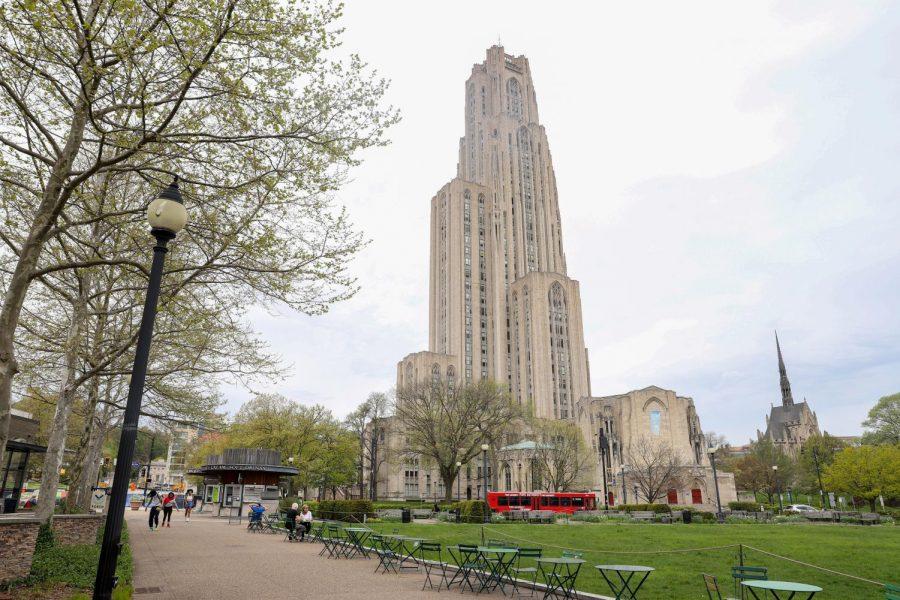Pitt to require unvaccinated students to comply with stricter health rules
Kaycee Orwig | Senior Staff Photographer
The Cathedral of Learning watches over an empty Pitt campus.
July 1, 2021
Chancellor Patrick Gallagher said in a Thursday email that students who do not voluntarily provide COVID-19 vaccination records will be assumed as unvaccinated, and the University will require these students to comply with stricter safety guidelines.
“Since the University does not generally know who is fully vaccinated, we have adopted the following approach: For health requirements that the University is responsible for enforcing, we will assume that everyone is unvaccinated unless an individual voluntarily provides evidence that they are fully vaccinated,” Gallagher said.
While “detailed information on this approach is forthcoming,” according to Gallagher, student information on their vaccination status will be protected, and only used to determine which health requirements apply. The email was one of two sent Thursday afternoon to provide additional details about Pitt’s health plans for the fall in the wake of the ongoing COVID-19 pandemic.
Kenyon Bonner, the vice provost and dean of students, said in a Thursday email that students living in University housing must either submit proof of vaccination or request an exemption through the Student Health Center to not have to comply with the extra precautions for unvaccinated individuals.
Vaccinated students are not required to follow most health guidelines, including routine testing, contact tracing, shelter in places or quarantining. Unvaccinated students must follow health guidelines including sheltering in place for at least seven days before and after moving in, submitting a negative test before move-in, taking a second COVID-19 test 48 hours after moving in and participating in mandatory routine testing. Pitt’s current COVID-19 guidelines only require masks to be worn indoors, but according to Bonner, unvaccinated students are required to wear masks both indoors and outdoors.
Faculty and student leaders have pushed back against the University’s decision to not impose a vaccine mandate. Pitt’s Senate Council at its May 26 meeting voted 79% in favor of mandating a COVID-19 vaccine for students, faculty and staff to be on campus. Pitt’s Student Government Board said in a late June statement that it stands in “solidarity” with the Senate Council vote.
Robin Kear, the University Senate president, said she continues to encourage all Pitt community members to get a COVID-19 vaccine before the fall semester.
“Senate Council encouraged the administration to create a requirement, and they have many considerations when making this decision,” Kear said. “We will be discussing the implications of not having a requirement for classrooms, research, and other student learning activities and working through issues and concerns.”
Gallagher said he, along with medical experts, believes getting vaccinated is the “most important thing you can do” to protect yourself and others from the virus. He said Pitt administrators’ plans for the fall depend on the assumption that everyone is vaccinated.
“We are strongly recommending that every member of our campus community be fully vaccinated, and our planning efforts to date assume that everyone follows this recommendation,” Gallagher said.
Pitt community members can register for a vaccine appointment during the summer and fall, which will take place at the Nordenberg Hall clinic. Pitt students, faculty and staff who are vaccinated against COVID-19 are also eligible to receive prizes, including up to $2,500 in cash.
Gallagher said as new variants of the virus emerge, health-based requirements will continue throughout the fall to create a “low risk environment” for staff and students.
“Come fall, our campus operations will continue leveraging health-based requirements — like testing, contact tracing, and isolation and quarantine — to help us maintain a low-risk environment for all University members and campus activities,” Gallagher said. “And, much like last year, we anticipate that health guidance will continue to evolve as circumstances warrant and that COVID-19 outbreaks will continue to disrupt travel — especially international travel.”
This story has been updated.



